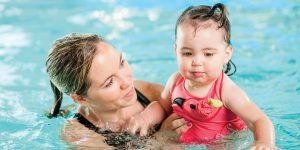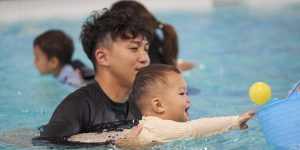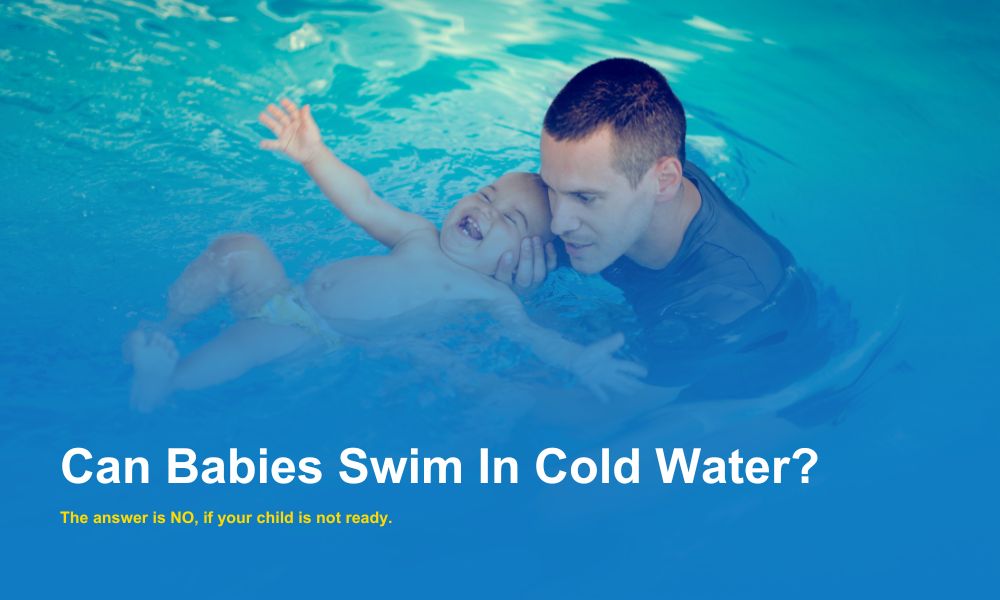Many parents wonder, ‘Can babies swim in cold water?’ The answer is NO, if your child is not ready. While infants can be introduced to water at a young age, their ability to tolerate cold temperatures is limited. It’s crucial to ensure that the water is warm enough for their comfort and water safety. Babies have less body fat than older children, making them more susceptible to cold.
If you plan to take your baby swimming, make sure the water temperature is comfortable, ideally around 32°C (90°F) or higher. Always monitor their reactions to the water and keep the swimming sessions short to avoid exposing them to uncomfortable conditions.
The true story of my students
“Sarah has forgotten how to swim. We went to a friend’s pool on the weekend, and she nearly drowned. She jumped into the pool and just barely made it back to the side. I feel like we will have to start all over again.”
I hear comments like this from parents at the beginning of the swim season all too often. The root of the problem often lies in the cold water temperature. At this time of year, even outdoor pools with solar heating can be chilly. This sudden shock of cold water can lead to cold water shock, causing young swimmers to instinctively lift their heads out of the water. As a result, their legs sink, and mild panic can set in, making it difficult for them to catch their breath. It’s an unpleasant experience for everyone involved.
Understanding Cold Water Shock
These incidents can be avoided if parents recognize the negative effects of swimming in cold water, especially for inexperienced swimmers. Until the weather warms up, if your child is going to swim in an outdoor pool, it’s crucial to help them acclimate to the water temperature. Here are some tips to ease the transition:
- Ease Into the Water: Encourage your child to sit on the pool steps or slide in gradually, allowing their body to adjust to the cooler temperature.
- Take Your Time: After changing into swimsuits, give them time to adjust before jumping into deeper water. This gradual exposure helps them understand how to handle swimming in cold water.


Gradual Exposure is Key
Allow your child to get wet slowly. If they are hesitant to put their face in the water or perform the swimming skills they mastered during lessons, that’s perfectly fine. Their reluctance is likely not a sign that they’ve forgotten their skills; rather, it reflects their discomfort with the cold water at this stage of their development.
With patience and gradual exposure to the cooler water, children will become more familiar with the temperature. Over time, they will regain their confidence and start using the skills they’ve mastered in swimming lessons.
Special Considerations for Young Swimmers
It’s important to remember that cold water shock affects children and adults, particularly those with low body fat. They are more sensitive to the cold, which can further hinder their swimming abilities. Parents should also be cautious about the pool temperature for kids; colder pools can significantly impact their comfort and performance.
If your child is particularly sensitive to cold, it’s essential to monitor their comfort level. A child who gets cold in the swimming pool may become anxious about swimming, making the situation worse. Encourage them to take breaks and warm up if needed.
When is it Too Cold to Swim?
As a general rule, it’s advisable to avoid swimming in water that feels uncomfortably cold. Is it ok for kids to swim in cold water? It depends on their comfort level and ability to adapt. Always prioritize your child’s well-being, and if they express discomfort, it may be best to postpone swimming until the water warms up.
By understanding the challenges of swimming in cold water, you can create a safer and more enjoyable swimming experience for your child. Being aware of how cold water affects baby swimming abilities and providing a gradual introduction to cooler temperatures can help avoid situations where your child feels overwhelmed.
In conclusion, enjoy your time at the pool, but remember to be mindful of the water temperature and its effects on your child’s swimming experience. Proper acclimatization can make all the difference in their confidence and enjoyment.
Chris Shapland

